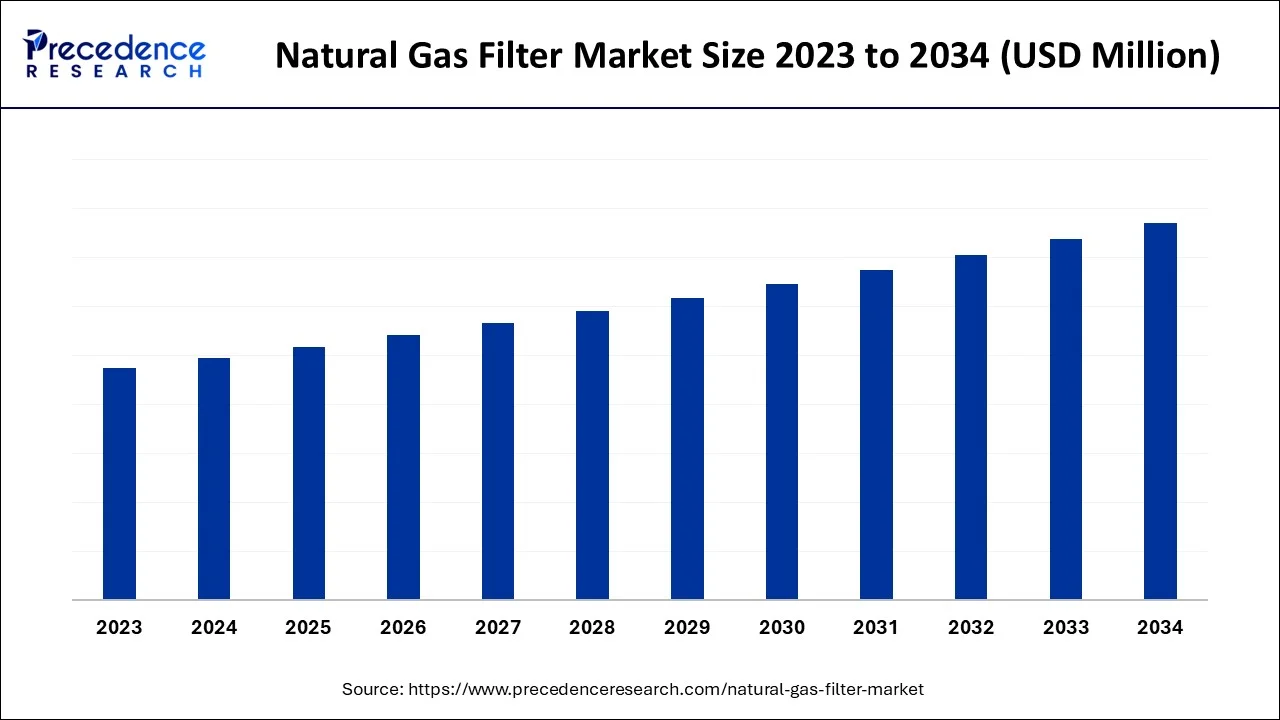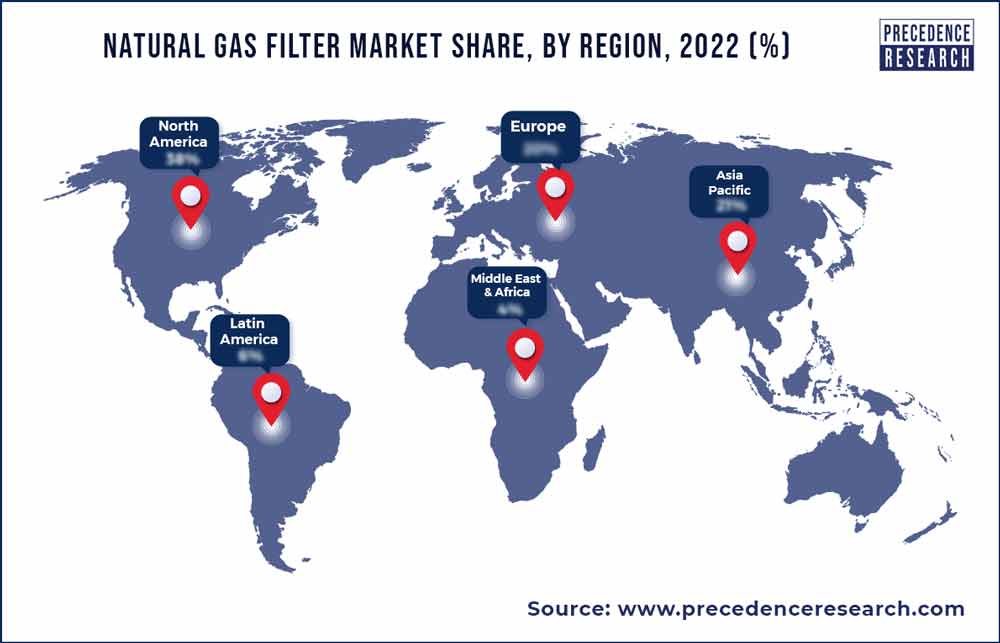August 2024
Natural Gas Filter Market (By Type: Large, Medium, Small; By Applications: Petroleum, Chemical, Automotive, Metallurgy, Others) - Global Industry Analysis, Size, Share, Growth, Trends, Regional Outlook, and Forecast 2024-2034
The global natural gas filter market is expected to expand at the fastest CAGR during the forecast period. North America region is predicted to register the maximum market share from 2024 to 2034.

Natural gas filters are devices used to extract impurities, contaminants, and particulate matter from natural gas streams to ensure their purity and protect equipment downstream. Its filters are essential in various sectors, such as natural gas production, processing plants, pipelines, distribution networks, power generation, residential and commercial gas systems, and automotive vehicles powered by natural gas. These filters maintain natural gas quality and efficiency by removing solid particles, liquid droplets, oil mists, moisture, sulfur compounds, and other contaminants.
The market is driven by increased demand for natural gas, stringent environmental regulations, and equipment protection and longevity. Growing global demand for natural gas as a cleaner and more environmentally friendly energy source than coal and oils. As countries and industries transition to cleaner energy alternatives, the demand for natural gas and its associated infrastructure, including filtration systems, rises accordingly.
Furthermore, stringent environmental regulations are becoming popular as governments and environmental agencies worldwide have imposed increasingly strict regulations to reduce emissions and promote cleaner air quality. This drives the demand for natural gas to comply with emission standards and meet the criteria set by environmental regulations. Thus, the natural gas filter market is expected to grow significantly in the coming years as industries adopt cleaner practices and technologies.
Moreover, the equipment protection and longevity, limited infrastructure, safeguard downstream equipment from damage, ensuring their longevity, and maintaining operational efficiency. Natural gas comprehends impurities, contaminants, and particulate material that can adversely affect equipment performance and lifespan. These impurities can cause corrosion, clogging, and abrasive wear, reducing efficiency, amplified maintenance costs, and potential equipment failures. Also, the cost savings associated with equipment protection and longevity drive the demand for natural gas filters.
The lockdown measures implemented by various governments in anticipation of the COVID-19 pandemic have disruptions in supply chains and manufacturing, leading to a slowdown in economic activity and affecting demand for natural gas filters. On the other hand, the pandemic has also highlighted the importance of cleaner energy sources, which has increased interest in natural gas. The pandemic has also increased government stimulus spending on infrastructure projects and clean energy initiatives, which could provide opportunities for the natural gas filter market in the long term.
| Report Coverage | Details |
| Largest Market | North America |
| Base Year | 2023 |
| Forecast Period | 2024 To 2034 |
| Segments Covered | By Type and By Applications |
| Regions Covered | North America, Europe, Asia-Pacific, Latin America, and Middle East & Africa |
Government initiatives to promote green energy to brighten the market prospect
Natural gas as a cleaner and more environmentally friendly energy source continues to rise. As natural gas consumption increases in various sectors, such as power generation, industrial processes, and transportation, the demand for natural gas filters also grows to ensure the purity and quality of the gas. Government and environmental agencies worldwide have implemented strict regulations to reduce emissions and promote cleaner air quality.
Adopting natural gas infrastructure, including pipelines, processing plants, and distribution networks, drives the demand for natural gas filters. Also, essential components in these infrastructure systems are to maintain the integrity of the gas and protect downstream equipment from contaminants and particulate matter. Using natural gas filters will be critical in ensuring the cleanliness of the gas filters, enhancing equipment performance, reducing maintenance costs, and extending the lifespan of critical components. Furthermore, governments and industries worldwide are investing heavily in cleaner energy sources and promoting the implementation of effective filtration technologies. As the infrastructure for effective filtration systems and distribution networks expands, the demand for natural gas filters will likely increase to meet the needs of this growing market.
Growing adoption of compressed natural gas (CNG) in automobiles
Compressed natural gas (CNG) is increasingly being used as an alternative fuel in transportation, particularly in vehicles such as cars, buses, and trucks. CNG vehicles require effective filtration systems to remove impurities, moisture, and contaminants from the compressed gas before it enters the engine. Natural gas filters play a crucial role in ensuring the cleanliness and quality of CNG, protecting the engine, and ensuring optimal vehicle performance. Also, CNG vehicles often offer cost savings compared to traditional gasoline or diesel vehicles.
Adopting CNG vehicles requires the development of CNG refueling infrastructure, such as stations and distribution networks. As the infrastructure expands, the demand for natural gas filters in these systems also grows. Furthermore, governments and industries worldwide are investing heavily in developing renewable energy sources and infrastructure, which is expected to drive the growth of the natural gas filter market. As the infrastructure for renewable energy sources and CNG supply and distribution expands, the demand for natural gas filters will likely increase to meet the needs of this growing market.
The price volatility of natural gas filters is causing hindrances to the market
Price fluctuations in natural gas can create uncertainty for businesses and investors in the natural gas filter market. High volatility and unpredictable price movements make it challenging to forecast future demand and plan investments in manufacturing capacity and research and development. The uncertainty can deter companies from making long-term commitments, impacting the growth and expansion of the market. Large-scale projects, such as pipeline construction or natural gas processing plants, often have long planning and implementation periods. If natural gas prices fluctuate significantly during the project lifecycle, it can affect these projects' economic viability and profitability, leading to delays or cancellations.
Moreover, the Russia-Ukraine war caused so much disruption of the natural gas supply, especially to European countries. For instance, in January 2023, European Union energy regulators announced they would start issuing a daily liquefied natural gas (LNG) price assessment. This step in the EU's plan to form a new super-chilled fuel European benchmark price. The volatile gas prices driven by Russia cutting gas purchases to Europe, Brussels makes LNG pricing more transparent to escape EU countries bidding against each another for supplies and possibly driving up prices further.
However, the perception and awareness of natural gas as a cleaner energy source can influence the demand for natural gas filters. Public perception, concerns about methane emissions, and the preference for renewable energy alternatives may impact the adoption of natural gas and, consequently, the demand for natural gas filters. Furthermore, the growing demand for natural gas and the continued investments made in the natural gas industry by governments and industries worldwide can create an opportunity to drive innovation and cost reductions in the natural gas filter market.
On the basis of types, the natural gas filter market is divided into large, medium and small, with large segment accounting for most of the market. The demand for large natural gas filters is mainly driven by removing liquid droplets and aerosols from the natural gas stream. Hydrogen is widely used in these industries as a feedstock for producing chemicals and other products.
On the basis of the application, the natural gas filter market is divided into petroleum, chemical automotive, metallurgy, and others, with the petroleum segment accounting for most of the market. This is because natural gas filters are widely used in the petroleum industry to remove impurities and contaminants from natural gas before it is used for various purposes such as refining, processing, and transportation.
North America dominates the market, primarily driven by the growing demand for natural gas in power generation, industrial applications, and transportation. The region is anticipated to witness considerable growth in the natural gas filter market during the forecast period, driven by various factors such as the surging implementation of the natural gas industry, with broad pipelines, processing plants, and a rising market for natural gas filters. The United States is the major country driving the demand for natural gas filters in the North American region. The country has a well-known natural gas industry, the major end-user of high-purity natural gas. In addition, these countries are spending greatly on infrastructure and fuel cell technology, which is anticipated to drive the demand for natural gas filters in the region.

Europe has a substantial market for natural gas filters, with Germany, the United Kingdom, and France being the major suppliers to the market's growth. Countries like Germany, the United Kingdom, and Italy have major natural gas filter markets due to the higher use of natural gas in various industries and the adoption of renewable natural gas (RNG). This is due to the surging adoption of cleaner energy sources and a mature natural gas infrastructure. These countries have well-established industries that are major consumers of high-purity natural gas, and they are investing heavily in developing natural gas infrastructure and technology.
The region in Asia-Pacific is anticipated to have the greatest CAGR. The market is driven by increasing demand for natural gas and the growing focus on clean energy sources. Several factors, such as industrialization, urbanization, and the need for environmental sustainability, influence the market.
Segments Covered in the Report:
By Type
By Applications
By Geography
For inquiries regarding discounts, bulk purchases, or customization requests, please contact us at sales@precedenceresearch.com
No cookie-cutter, only authentic analysis – take the 1st step to become a Precedence Research client
August 2024